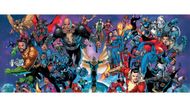The cinematic universe constructed from DC Comics' iconic roster of superheroes and supervillains is as expansive as its comic book roots. You have got Batman brooding in Gotham’s alleyways, Aquaman doing his fish-king thing underwater, and Wonder Woman hanging out on some mythical island. The films are all over the place. Some are tangled together in the DCEU web, and some just do their own thing, totally ignoring the rules.
DC's approach to filmmaking has embraced both a shared universe (DC Extended Universe) and rich "Elseworlds" alternatives. It has, hence, resulted in a viewing order that can confuse even the most devout fan.
Man of Steel crashed onto the scene back in 2013, kicking off the DCEU rollercoaster that Warner Bros. has been riding ever since. They have tried to juggle everything: Origin stories, big superhero mashups, even dipping their toes into multiverse. You have got the Justice League trying to assemble, edgy anti-heroes popping up in Suicide Squad, and then these offbeat one-offs like Todd Phillips’ Joker or Matt Reeves’ super moody The Batman. And now James Gunn is shaking things up again with his own reboot plans. It’s ambitious, sure, but man, has it been complicated.
These movies are all over the place — critics bicker, fans argue on social forums, but these films have left a massive mark on pop culture. If you are trying to binge without giving yourself a headache over timelines, you have to watch them in the right order. Release order, timeline order… It’s a whole thing.
So, we have combed through everything to put together the clearest, most current watchlist for DC movies in chronological order.
Understanding the DC Cinematic Universes

DCEU: The Extended Universe
The DCEU was DC’s big shot at keeping pace with Marvel. You get that whole run, starting with Man of Steel back in 2013 and wrapping up with Aquaman and the Lost Kingdom in 2023. In between, you have got heavy-hitters like Wonder Woman, Justice League, Shazam!, and The Suicide Squad. They threw in crossovers, cameos, tangled storylines, and everything.
Elseworlds and standalone films
Now, we also have the Elseworlds label. This is where they toss in movies that do their own thing, totally outside the main timeline: Joker (2019), The Batman (2022), and more on the way. These flicks are not worried about fitting into some mega-franchise puzzle.
The DCU: James Gunn’s reboot
And now, James Gunn and Peter Safran roll in. In 2025, we got a new Superman to kick off their new DCU. The goal is to bring movies and TV shows under one big umbrella. They are promising the best of both worlds — some old faces, some brand-new spins. Essentially, it is a reboot without tossing out everything that worked before.
Why does chronological order matter?
If you start watching movies in the order the story actually happens (not the order they came out), it is a total game-changer. You will catch all the little character changes, watch the whole universe morph, and see those story threads tying together way more clearly.
Sure, the timeline’s a mess sometimes, but if you nail the order, it is way easier to keep up, especially if you are new or just wanna get your head straight before the next reboot drops.
The definitive chronological order: DCEU and more

If you want to binge the whole cinematic universe, buckle up, because here’s the ultimate order to tackle every flick and show, through mid-2025. This is the least confusing path through the chaos:
Wonder Woman (2017)
Kick things off in 1918. Diana Prince (Gal Gadot) leaves Themyscira, learns humans are confusing, and punches a bunch of Germans. This one is centered around her origin story and the Amazonian upbringing.
Wonder Woman 1984 (2020)
Fast-forward to the Cold War era. Diana’s still around, making questionable wish-based decisions. The plot is a little here and there, but you will get why she is so jaded later.
Man of Steel (2013)
Now we are in modern times. Clark Kent figures out he is Superman. This one sets the moody, slightly existential tone for everything that follows.
Batman v Superman: Dawn of Justice (2016)
Eighteen months after Man of Steel, Bruce Wayne is big mad at Superman. They punch each other, then become frenemies. Wonder Woman jumps in, steals the show, and the stage is set for way too many heroes.
Suicide Squad (2016)
After all that, the U.S. government-sanctioned team assembles from imprisoned villains. It sets up Amanda Waller and Harley Quinn’s narrative arcs.
Justice League (2017) and Zack Snyder’s Justice League (2021)
Pick your poison: The studio cut or the four-hour Snyder thing. The big guns: Batman, Wonder Woman, Aquaman, Flash, Cyborg, and Superman, team up to fight Steppenwolf. Snyder’s version is longer and more coherent, but not everyone agrees it is canon.
Aquaman (2018)
Arthur Curry finally gets his own story. It chronicles around his claim to the Atlantean throne and his heritage. The film builds the underwater lore within the universe.
Shazam! (2019)
We get a kid who turns into a superhero by yelling a magic word. Tonally, it is lighter, funnier, and full of Easter eggs. You will want a cape after this one.
Birds of Prey (2020)
Harley Quinn ditches the Joker and forms her squad of misfits. It is loud, colorful, and doesn’t care about your feelings. She is living her best, most chaotic life.
The Suicide Squad (2021)
James Gunn takes over, and the franchise remembers how to be fun again. Old faces, new faces, a giant starfish, just go with it. Think of it as a soft reboot with more heart (and body count).
Peacemaker (2022, series)
John Cena gets his own show, and it is weirder and more heartfelt than anyone expected. Picks up right after The Suicide Squad. You get violence, laughs, and some surprisingly deep moments.
Black Adam (2022)
Dwayne Johnson finally shows up to shake things up. Ancient anti-hero, the Justice Society, lots of lightning.
Shazam! Fury of the Gods (2023)
Billy Batson and his foster fam are back. Takes place a couple of years after the first Shazam. More magic, more monsters, and Helen Mirren chewing scenery.
The Flash (2023)
Barry Allen breaks the multiverse, meets multiple Batmans (Keaton and Affleck, both), and things get real confusing, real fast. Seriously, save this one for near the end, or you will have a headache.
Blue Beetle (2023)
Jaime Reyes finally gets his shot. The story is kind of a standalone, but timeline-wise, it makes sense after The Flash. He is new, fresh, and he brings in some heartfelt Latinx family vibes.
Aquaman and the Lost Kingdom (2023)
Last stop (so far). Arthur’s back for a final run, wrapping up the DCEU before James Gunn reboots everything. Think of this as the epilogue to the madness.
Expanded and alternative viewings

Standalone/Elseworlds entries
If you are itching to see it all get weird or just want the best of the bunch, you can’t skip stuff like Joker (2019), The Batman (2022), or Joker: Folie à Deux ends up being. These movies don’t bother fitting into the main continuity, and that is half the charm. They go off and do their own thing, and do they pull it off? It is what you watch when you are tired of all the superhero homework.
DCU reboot timeline (Starting 2025)
In 2025, James Gunn’s Superman kicks off a whole new era. After that, you have got projects like The Authority, Batman: The Brave and the Bold, and Supergirl: Woman of Tomorrow lined up. All of them are supposed to play nice in the same sandbox this time. Will it work? Who knows. But at least it is gonna be interesting to watch it unfold.
Love movies? Try our Box Office Game and Movie Grid Game to test your film knowledge and have some fun!
